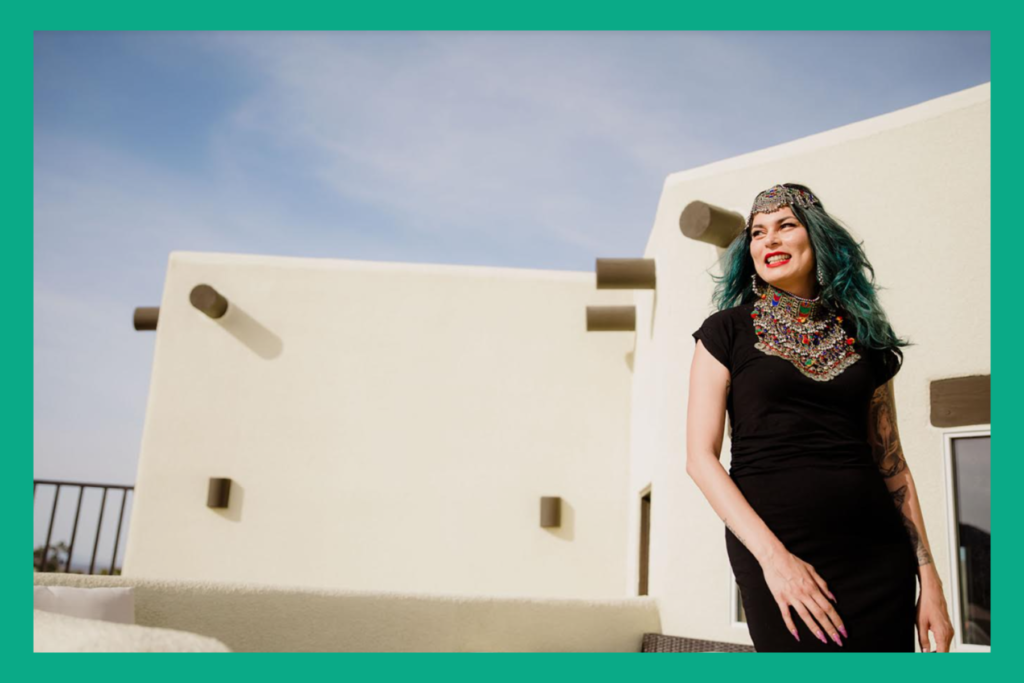
As I conveyed in my Brown Girl Magazine editorial, home is a complicated word for displaced children of the diaspora. It’s a complication that causes pain and confusion, often leading to varied responses to our ancestry, including walking away from it, diminishing it, or idealizing it. I want to suggest that turning toward it, learning about your culture, and your ancestry on your own terms—not what it means to anyone else—is the key to undoing the anxiety, body shame, attachment issues, depression, and everything else that we’ve been living with.
[Read Related: Home: A Complicated Issue for Children of Diaspora]
Embracing your full self—on your own terms—is the source of all self-trust and self-confidence. Whether that is speaking up for your needs or forgiving yourself for mistakes or harm you’ve caused, it all starts with how you see yourself. When we reject the narratives of others, we can finally write our own. I remind my Afghan diaspora siblings of this point all the time: We get to define ourselves. And we’re doing it every day.
Think about it. A lot of the pain we experience is because other people tell us what it means to be Afghan. They have decided that we are to be feared, pitied, or ignored. With our families, our identity can be a source of nostalgia, idealization, or something cast aside when we arrived here.
But what if you get to decide what it means? What if you learn the traditions—the recipes, the regional dress or music, the religion, the history—through your own lens? And what if you found other people like you who are doing the same thing? You might finally be able to see past the picture that has been painted in history books and newspaper articles, written by people who have not been to your country and those who have their own agenda of objectification. Their agenda is not our agenda is not your agenda. Often we start believing outside images because they are the only ones we’ve been given.
View this post on Instagram
So, I invite you all at Brown Girl Magazine to complete a homework assignment I assign in my Afghan women’s group: Learn and research something about your heritage that is new to you. This could be anything from a scent, a type of soap, an herb, or a piece of music. Learn about it from an outside source—there is more than you realize on the Internet and in the local university library. And then you get to decide what it means for you, maybe by incorporating it into your life.
For example, learning about the pre-Islamic history of Zoroastrian Afghanistan gave me a more nuanced understanding of some of our traditions. I loved learning about the ritual burning of spand/esphand and the use of the evil eye. These days, many elder Afghans glare at my tattoos. But I have the knowledge that the nomads of Afghanistan have face and hand tattoos called khaal. Even today, there are many religious minorities in Afghanistan who are unfortunately suffering the pain of discrimination from our own people. Our pain is shared.
[Read Related: Therapy is Showing me how to Reclaim my Life]
Explore your ancestors with an internet search. Look for names of people who share heritage with you, or who have learned from your people. I know sometimes there aren’t many options, and often it is a university’s “Middle Eastern Studies” or “South Asian Studies Department” that holds the monopoly on your information. But find a starting point, and then dig deep to see what you can find.
Like it or not, even social media can help you find reputable sources and information. One of my favorite accounts is @burqasandbeer (find her on Patreon—it’s worth it!) for understanding Afghan history and its current socio-political implications. For current updates about Afghanistan, I focus on people and organizations who are still living and/or working within the country, including the Uplift Afghanistan Fund and WISE Afghanistan.
I must say, the best experience I’ve had in completing this assignment is asking my relatives and elders. They love that I have taken an interest in my culture, and they often get a giggle out of the very specific questions I have. Depending on if your family elders are a comfortable place to start, they often have first-hand knowledge that they haven’t been able to share. Maybe it’s painful for them, or maybe you rejected it while growing up. Listen to their stories, maybe even record some of them. Create a family tree if you can. If you don’t have a lot to go on, you can simply research the story of your name, see what meaning it has and where people tied to your name are from. Learn the names of the towns. And then when you have those, you can learn about the dress, climate, music, food and other things about that particular place.
[Read Related: Why I Finally Started Therapy. And Why I Won’t Stop.]
You may even experience grief and guilt as you start learning very basic things about your history and uncovering where you might have bought into the messages that others strategically want for you to justify their occupation or exploitation. It’s never too late to learn for yourself and decide what you think. Remember, you can’t appropriate your own culture. You have as much right to an opinion (or perhaps even more right) as anyone else. Also, remember that not everyone has access to this luxury of knowing about their heritage. We owe this to ourselves—and the worlds we come from.
Start here. And you’ll be practicing a skill that will come in handy the next time someone tries to tell you about yourself or pressure you to assimilate or disassociate from your culture. This work will do more to strengthen your self-image and heal your ancestral wounds than any therapy session or family dinner.
View this post on Instagram
Photo Courtesy of Kelly Robyn Photography.




